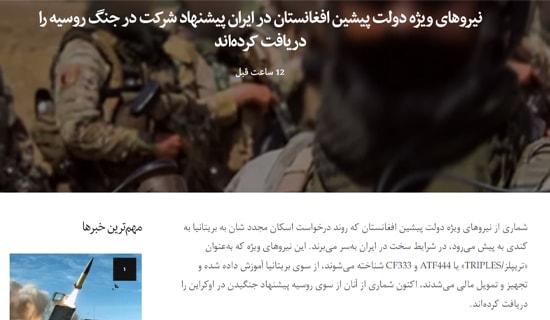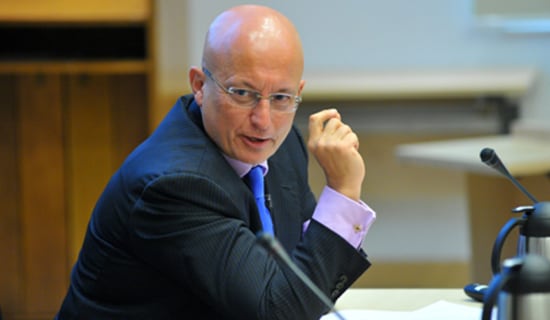Russia This Week is a weekly review by the MEMRI Russian Media Studies Project, surveying developing stories in Russian domestic affairs as presented in the Russian media.

This issue concentrates on the reaction to the arrest of Russia's Economic Development Minister Alexey Ulyukaev for alleged extortion and bribe taking. The arrest sent shock waves through the Russian elite.
Putin Mania

Putin's image appears on Russian chocolate bars (Argumentua.com)
In The News:
The Arrest Of Minister Of Economic Development Ulyukaev 'Is A Tectonic Convulsion For The Authorities'
On November 14, the Federal Security Service arrested the Russian Minister for Economic Development, Alexey Ulyukaev, suspected of extorting a two billion dollar bribery payment from the Rosneft state oil company. According to the Central Investigative Committee, Ulyukaev sought to extort the bribe in exchange for issuing a positive assessment on a deal between Rosneft and Bashneft (72% state-owned), which enabled Rosneft to purchase a 50-percent stake in its former rival Bashneft]
(M.sledcom.ru, November 15)

Alexey Ulyukaev (Rt.com)
On November 15, Putin's press spokesman Dimitry Peskov announced that the Russian president had relieved Ulyukaev of office due to "lack of confidence".
(Vedomosti.ru, November 15)
According to various Russian media outlets, Ulyukaev, along with other governmental officials publicly expressed his opposition prior to the deal, while the final decision was taken by the prime-minister and the president. It should be noted that Medvedev's government official position was also hostile towards the deal, and the same was true for Putin who subse, who changed his mind later. Ulyukaev also opposed additional governmental funding for Rosneft company in 2014.
(Novayagazeta.ru, November 16)
Rosneft is run by Igor Sechin, Putin's personal friend and ally. Thus, according to Novaya Gazeta columnist Julia Latynina, it defies belief that the minister would attempt to extort a bribe from such a figure "that is akin to a sparrow extorting a lion". According to Latynina, Rosneft the merger and acquisitions king has its sights on other oil and gas companies and perhaps the next target will be Lukoil. The Ulyukaev affair will chasten those who attempt to stand in its way..
(Novayagazeta.ru, November 15)
Experts believe that Ulyukaev's arrest may impede the privatization of the government's 19.5% share in Rosneft (announced in August 2014) and will allow the company to buy back its own stocks.
(Ria.ru, November 15)
According to the Kremlin's spokesperson Dmitri Peskov, Putin was from the very beginning informed of the covert surveillance and investigation against Ulyukaev, which started over a year ago.
(Ria.ru, November 15)
Moreover, deputy -PM Arkady Dvorkovich, and Putin's personal economic aide Andrey Belousov, who both publically opposed the Bashneft sale were targets of FSB covert surveillance and investigation.
(Vedomosti.ru, November 16)
In an article published by the English-language newspaper The Moscow Times, journalist Boris Grozovsky wrote: "When the economy is in bad shape, it's always a good idea to go after those who are responsible for it. But today's news that Russia's top economic official was detained is unprecedented: no incumbent Russian government minister has been arrested since 1991... Law enforcement has leveled the most serious possible corruption charges against Ulyukaev. If found guilty, he faces up to 15 years in prison or, at a minimum, a fine equaling 3-5 years of his salary.
"Ulyukaev is traditionally considered a representative of the liberal and reformist wing of the government. He got his start reforming the government in 1991, while working as an assistant to former prime minister Yegor Gaidar. But that was 25 years ago.
"Today, Ulyukaev is one of the wealthiest officials in charge of the Russian economy. According to his income declaration, he owns 16 hectares of land, three homes, and three apartments. His salary for 3-5 years could be as much as $3 to $5 million.
"The Investigative Committee stated that the case against Ulyukaev stems from extensive FSB operations: intelligence agencies had the minister under surveillance for more than a year, and sources in state information agencies say that phone taps were used on him and his associates to produce the weighty evidence of the bribe.
Last month, Rosneft paid 329.7 billion rubles for a controlling stake in Bashneft. If we are to believe the investigators, Ulyukaev's 'commission' on the deal amounted to 0.04 percent of that total. At the same time, the authorities have no complaint against Rosneft: in their view, the company acquired Bashneft legally. This might indicate that Rosneft has been cooperating with the investigation from the beginning.
"However, it is more likely that this was a special op by the security forces, overseen by the FSB and coordinated and sanctioned from the top. A Kremlin spokesman said President Vladimir Putin was aware of events from the beginning, and Prime Minister Dmitry Medvedev made a carefully worded statement calling for a thorough investigation.
"The minister's arrest is a tectonic convulsion for the authorities. Criminal case details are always important in the arrests of senior officials. Unlike most high-profile arrests of allegedly corrupt officials, the security services did not offer any incriminating videos when the news came out on the morning of Nov. 15. It remains unknown where the supposed bribe took place, who gave it, and how it was given. Was the bribe fabricated? According to information about the arrest leaked from the Investigative Committee, Ulyukaev initially thought the whole thing was a joke or a mistake and kept asking everyone, 'What in the hell is going on here?' Maybe he had no idea that someone was planning to give him a bribe.
"Of course, it is easy to believe that a Russian official could extort a bribe from a business. But it is equally easy to believe that the investigative authorities could fabricate groundless charges against an official.
The privatization of Bashneft had been the subject of heated debate in the government ever since this summer. Rosneft wanted access to the deal, but all of the economic officials, including Ulyukaev, opposed the idea. However, Igor Sechin - operating as only he can - convinced Putin that it would benefit the state if Rosneft was able to offer the highest bid for Bashneft. The result: the government let one state-owned company purchase another.
"A similar debate arose three years ago when economic ministers opposed Sechin's plan for Russian Railways to purchase the Novorossiysk Commercial Seaport. That time, the ministers prevailed. The Economic Development Ministry has resisted Rosneft more than other ministries. For example, Ulyukaev's ministry did not fulfill several of Rosneft's financial requests in 2015. If Ulyukaev was the primary opponent of Rosneft purchasing Bashneft, could his arrest be a recrimination for that stance? Is it a warning to others not to argue with Rosneft?
"Actually, Rosneft had no need to make a point by frightening its opponents. The Economic Development Ministry has raised significantly fewer objections to Rosneft as of late. The controversial question of regulating the way state-owned companies make procurements or disclose financial information, among other issues, has increasingly been resolved in the interests of the companies themselves. If the charges against Ulyukaev are entirely trumped up, the criminal proceedings against him should prove interesting.
Bashneft's privatization was unprecedented. The VTB Capital investment bank organized the sale, and, when the bank announced the tender in July, nine companies - including Lukoil, Russia's largest private oil company - expressed an interest. However, in the end, Rosneft emerged as the main contender, even finding a way to cancel the public auction and proceed without any competitors.
Did Ulyukayev oppose it? On October 12, President Putin said that he was "surprised" by the position of the financial and economic bloc of the government that, he said, insisted the state sell Bashneft to Rosneft. How could the economic bloc of the government have reversed the position it held just one month earlier, in late August and early September?
In fact, the case against Ulyukaev looks quite absurd. Rosneft is a gigantic state-owned company, and is, thanks to its director, Igor Sechin - a close friend of Vladimir Putin - the most influential company in the country. Who is Ulyukaev, therefore, to demand a bribe from Sechin, let alone to accompany that demand with threats? This story stretches the imagination. Any official taking such an action would be committing professional suicide - hardly worth the risk for just $2 million.
The Russian economy is stagnating. Federal coffers don't fill nearly as easily as they used to. State-owned companies need money, discounts, loans, government contracts and guarantees, etc. The government finds it increasingly difficult to hand out favors to its "captains of industry."
The government's share of the economy is increasing, even as the overall size of the pie is shrinking - and officials, security service strongmen, and state-owned businesses are not accustomed to tightening their belts. They are still learning that trick, and so the battle for diminishing resources is heating up. In all likelihood, Ulyukayev is far from the last senior official who will fall victim to that struggle."
(Themoscowtimes.com, November 19)
The public reactions varied over the first 48 hours. Many of those concerned (including those serving in the government or state corporations) defined the arrest as a shock, which raises many questions. To quote just a few examples:
· Sergey Shvezov, first deputy chair Central Bank of Russia: "I treat Ulyukaev with great respect. Ulyukaev was the last person to be suspected of something like that. Everything is unclear right now"
· Aleksandr Shokhin, chair, Russian Union of manufacturers and entrepreneurs: "This is (the indictment) , to put it mildly, non-convincing. That (the bribery extortion) could have been done at the minute of temporal insanity, but definitely that could not been done in a sober mind".
· Igor Lebedev, the Duma's vice-speaker and Liberal Democratic Party member: "One can only rejoice that the real fight against corruption has started in Russia. We see that there are no untouchables anymore: mayors, governors and government ministers are getting arrested"
· Boris Titov, state business ombudsman: "In our view Ulyukaev does not correlate with corruption or bribery. His view was more economic development oriented, we attached certain hopes regarding his views".
· Aleksey Kudrin, deputy chairman of the presidential economic council, in the matter of Rosneft-Ukulayev too many questions still remain. An objective investigation is imperative.
· Mikhail Emelyanov, first deputy chair of Duma's state building and law committee: "This makes the changes in the government - at least in the financial-economic bloc - closer. Other liberal oriented ministers may be next in the line. It might happen less savagely than in Ulukaev's case, but there is no doubt there will be further changes in the cabinet".
· Anatoly Chubais, CEO of Rosnano state corporation: "For us, who know Ulukaev personally for more than 30 years, it's about a total shock. If the try to disregard emotions and a human compassion towards a friend who got into a bad situation... we should recall the golden rule -listen to both sides. One side tells that Ulukaev threatened Rosneft and extorted a bribe ( Apparently, I don't understand this world anymore). Thy did not yet hear the other side"
· Evgeny Yasin, scientific director of the Higher School of Economics national research center": "I think it's about "hunting" the liberals. Are you convinced by the explanation of fighting corruption by means of Ulukaev?"
(Rbc.ru, November 15)
· Mikhail Vinogradov, political science expert: "The Siloviki ( those representing the security and defense blocin the government and around Putin) have a growing appetite and elite circles are trying to prove that theyare well positioned after 2018 ( the presidential election year) even though president Putin has clearly started to change the team structure. The civilian ministries are being weakened."
(Vedomosti.ru, November 16)
Fedor Krasheninnikov, president of the Institute for the Development and Modernization of Social Relations sees a throwback to the Stalinist purges where serious accusations angainst ranking officials became a trump card for the authorities in resolving problems: "As the economic situation deteriorates, we can assume that the pinpoint repressions will continue and will even accelerate . By trying to force the apparatus to work more effectively and disinterestedly for the homeland's sake via such methods, the supreme authorities demonstrate their hopelessness and lack of perspective to the society: (it means) the notorious [power] vertical is riddled with thieves and corrupted personalities. Every new federal official or silovik arrested (for bribery) will drive society closer to the inevitable conclusion that they are all that way and the system should be completely changed ."
(Vedomosti.ru, November 16)
According to an editorial in Vedomosti, Ulyukaev's arrest means that intra-elite conflict is escalating due to the "shrinking economic pie." This episode dovetails with the trend of strengthening the repressive apparatus. The rising role of the security forces in Russia following the 2011-2012 protests caused the threats' map to expand. "Producing" the threats and fighting them is the most profitable undertaking for various figures since it allows solving political problems on the one hand, and redistributing assets and financial flows on the other. According to the editorial, repression signifies an unbalanced political system. By resorting to repression the system is destabilizing itself still further..
(Vedomosti.ru, November 16)
Russia Bans LinkedIn:
Federal Service for Supervision in the Sphere of Telecom, Information Technologies and Mass Communications (Roskomnadzor) announced it banned LinkedIn ."Based on the court's ruling that entered into force, the LinkedIn social network has been included in the registry of those violating the rights of personal data owners and is to be blocked by telecommunications operators," Roskomnadzor said in a statement. The Moscow City Court rejected LinkedIn's appeal against its blocking in Russia for violating the law on personal data localization. Under the law, the personal data of Russians can be processed and stored only in Russia.
(Tass.com, November 16)
Strange But True

On November 16, during the final ceremony of the Eurasian Intergovernmental Council, Russian PM Dmitry Medvedev praised his Belorussian counterpart Andrei Kobyakov for his effective work. The Belorussian PM answered that the eastern coffee helped him a lot. Medvedev replied that the last time they met the Belorussian PM asked for an Americano coffee. "That's not politically correct. Let's rename Americano into Russiano ...," said Medvedev jokingly.
In 2014, after Crimea's annexations to Russia, several coffee shops in Crimea changed the name Americano into Crimeiano.
The bar Ogonek in the Russian city of Yekaterinburg has already changed its entire list of Western brands into Russian ones. For example: Jack Daniel's whiskey is now "Zhora Denisov", American Honey whiskey became "Sweet Russia", New-York stake - "Voronezh-city stake", cocktail B-52 - cocktail Su-34 (referring to a Russian heavy bomber).
(Ria.ru, November 17)

Source: Facebook.com/ogonekEkb





